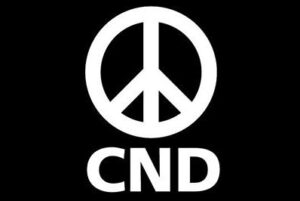 ONE YEAR AFTER the UN’s multilateral Treaty on the Prohibition of Nuclear Weapons (TPNW) entered into force, CND has launched a substantive report on the new treaty and its implications for British nuclear policies.
ONE YEAR AFTER the UN’s multilateral Treaty on the Prohibition of Nuclear Weapons (TPNW) entered into force, CND has launched a substantive report on the new treaty and its implications for British nuclear policies.
The report, Nuclear weapons are banned! What does this mean for Britain? comprises five main chapters which cover: security and nuclear challenges in 2022; a detailed commentary on the Treaty’s articles, prohibitions and provisions; analysis of UK nuclear policies, with emphasis on renewing Trident and the 2021 Integrated Review; five possible developments that would enable the UK to sign the TPNW; and practical disarmament steps the UK could take.
Among its recommendations, the report calls for:
- The UK to fully comply with its existing obligations under the 1968 Nuclear Non-Proliferation Treaty (NPT).
- The government to attend the first meeting of TPNW States Parties, scheduled for Vienna in March 2022, as an observer, as this will enable the UK to keep informed and participate constructively as the treaty’s verification systems get developed.
- That the Westminster and Scottish parliaments should undertake cross-party investigations to determine what would be entailed in pursuing nuclear disarmament and joining the TPNW.
Dr Kate Hudson, CND General Secretary said: “This is the most comprehensive and detailed report about the Nuclear Ban Treaty and British policies.This government is squandering millions of pounds a day on Trident when we should be creating more jobs in sustainable energy and helping the world to save the climate and accomplish nuclear disarmament.”
Dr Rebecca Johnson, the report’s author and CND Vice-President, said: “Nuclear war is an ever present accident waiting to be launched, and having nuclear weapons makes us more vulnerable, not safer. The TPNW has made nuclear weapons illegal, and with public support, local authorities and ethical investors are increasingly divesting from nuclear weapons. Britain urgently needs an informed public conversation about what our security means, and how we want to prioritise our resources.”
Kirsten Oswald MP, Chair of Parliamentary CND, said: “We don’t want to have nuclear weapons in Scotland – or anywhere. This is a very powerful and very timely report and I am sure it will be widely shared across civil society, church groups, trade unions, and political parties in the run in to the first meeting of TPNW States Parties. The report’s recommendations need to be carefully considered by all those interested in ending the waste of resources and risks associated with the holding of nuclear weapons.”
The Treaty on the Prohibition of Nuclear Weapons was negotiated at the United Nations in 2017 and entered into international legal force on 22 January 2021. It currently has 59 states parties and 86 signatories. The first meeting of States Parties is scheduled for Vienna in March 2022, but may be postponed due to Covid.
* Read Nuclear weapons are banned! What does this mean for Britain? here.
* Source: Campaign for Nuclear Disarmament